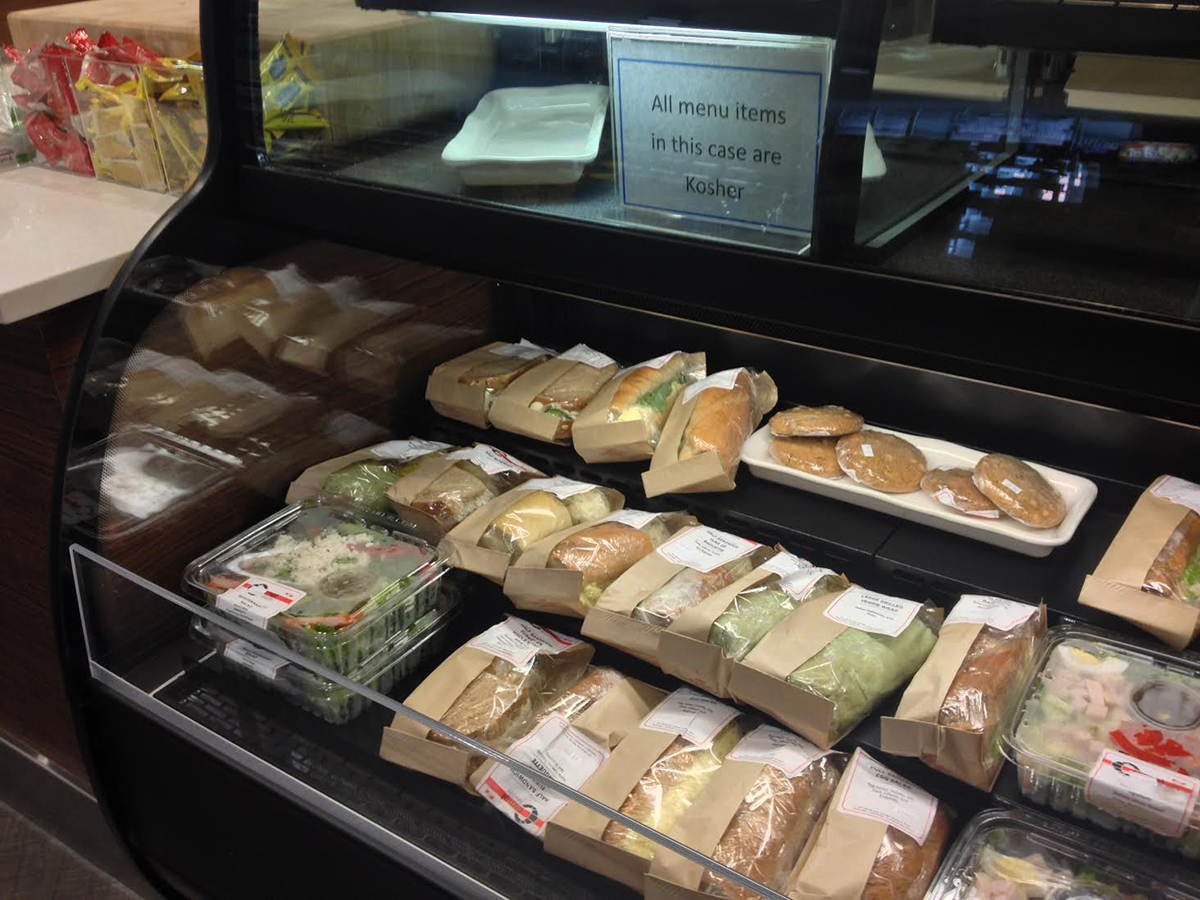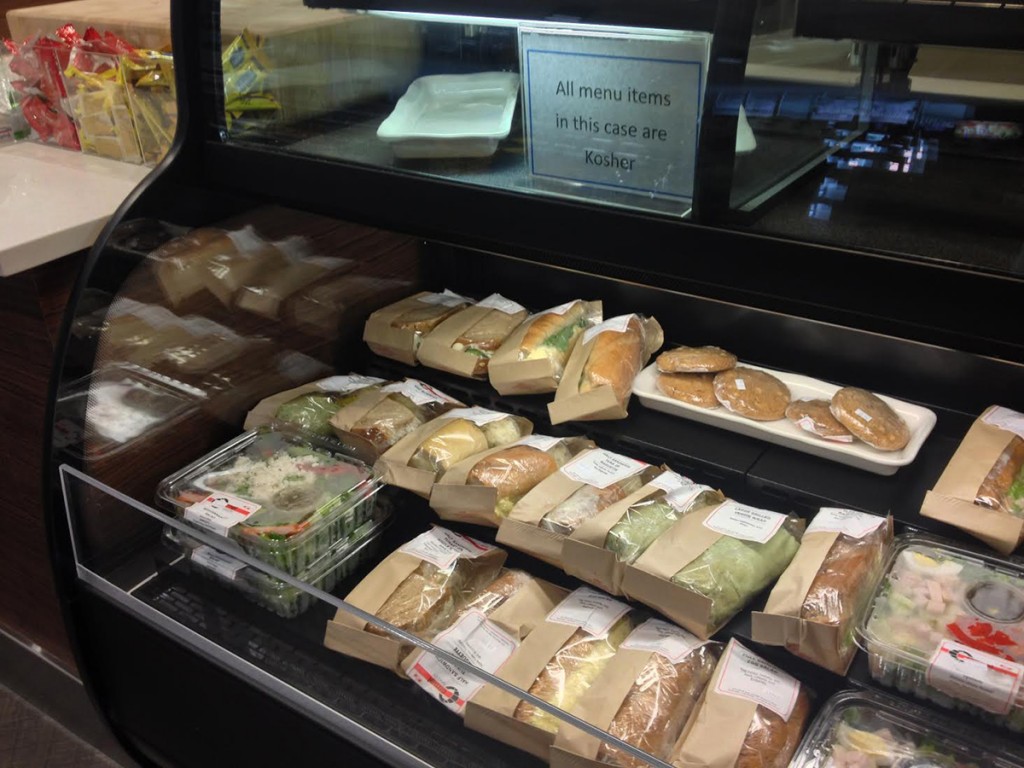

When freshman Eitan Snyder arrived at the University of Miami this semester, he was surprised by the absence of the kosher restaurant he had seen during his campus visit.
“I thought that Oasis was still going to be open, but it closed, so that’s hard, especially when the kosher cafe that will be in the new Hillel building won’t open until next year,” said Snyder, who has kept kosher his whole life.
To keep kosher one must follow the set of Jewish dietary laws regarding what food can and cannot be eaten, and how it must be prepared.
The removal of Oasis deli is one of a number of changes to kosher dining options on campus, and more are coming soon.
Oasis out, Pita Pad in
The university closed Oasis because it said it needed the space for offices, according to Eli Benhamou, who worked as the supervisor for the former full-scale kosher campus deli.
In its place, the university now has the Pita Pad, a Mediterranean food kiosk that is run by Benhamou under the supervision of UM Chabad. The Outtakes convenience store also offers grab-and-go kosher items produced by Kosher Miami or Orthodox Rabbinic Board Certified Caterers.
In addition, Outtakes sells frozen meals and has a microwave students can use for kosher food only. It is located on the counter behind the Corner Deli stand.
Snyder said he bought one of the kosher TV dinners from Outtakes and it was “not that bad.”
“I had an audition that went past when the dining hall closed, so I wanted to try it and see if it was good,” he said.
Snyder heard about the frozen dinners through word-of-mouth – the same way other kosher students told The Miami Hurricane they’ve learned about this year’s changes, despite the fact that Dining Services said all changes were communicated to students by email and phone.
He also didn’t know there was a designated kosher microwave, so he went back to his dorm to warm it up.
Challenges keeping kosher
While the university has made this attempt at supplementing kosher options, students who keep strictly kosher still struggle to do so on campus.
The most basic rules of keeping kosher include not eating pork and not mixing meat and dairy; however, observing it strictly entails using designated kosher cookware and appliances during food preparation as well as eating with kosher utensils and dishes. This makes finding kosher food a challenge.
“I have a lot of friends who came on to this campus keeping kosher and Shabbat, and they just stopped doing it because it was too difficult,” senior David Levin said.
Levin is concerned about the prices of kosher food at Outtakes. He said he has watched the prices rise over the past month, and he thinks that Chartwells did this because the grab-and-go sandwiches were competing with the new Corner Deli.
“I feel like now that Oasis is gone, there’s nothing really stopping the school from getting rid of kosher food as soon as it’s deemed unprofitable,” he said. “…It’s now $9 for half a sandwich; I bought a half-sandwich at the beginning for $4.99.”
Unkosher meal plans
Another problem is that kosher students living on campus are required to purchase meal plans for the dining halls at UM, which do not serve kosher food.
When Oasis was open, a kosher meal plan covered eight meals a week in the dining hall and allocated $500 dining dollars to be spent at the kosher deli.
Senior Caela Cohen, who was on the kosher meal plan her first two years at UM, said that she came to UM expecting to be able to find actual kosher food in the dining hall.
“For freshmen that keep kosher, it would be nice for them to get a nice, hot meal and be able to sit with their friends in the dining hall,” she said.
Some universities, such as Harvard and the Massachusetts Institute of Technology, have kosher areas in their dining halls. On the other hand, nearby University of Florida, which has the largest Jewish population of any college according to Tablet Mag, does not have kosher food readily available.
Benhamou said Chartwells, the university’s food service provider, has explored the ideas of having a kosher microwave or kosher foods in the dining halls but determined it isn’t feasible.
The ‘kosher’ meal plan has been discontinued, according to Armando Cuervo, manager of Dining Services, but a similar eight-meal option still exists.
Levin, who found it unfair that UM forced kosher residents to pay for food they can’t eat, said he contributed to this change.
“I proved to the Chartwells administration and Dining Services that the kosher meal plan was, in fact, not kosher,” he said.
They exempted Levin from purchasing a meal plan, and Levin says that kosher students living on campus should talk to Chartwells about doing the same thing.
A kosher future
For kosher students like Snyder, the easier the university community makes it to get kosher food, the better.
“My dad always explained that eating is something we do every day, so keeping kosher is something we do every day that reminds us of who we are,” he said. “I really liked that idea so I decided that I was going to stick with it when I went to college.”
Benhamou wants to fill in the gaps by expanding Pita Pad’s services and offering kosher catering, which he expects to launch within the next month.
The menu will be separate from the Pita Pad and available to anyone living on campus or nearby. Benhamou hopes to let people place their orders online, but they must be submitted at least a day in advance.
“It would be just as if they walked into a kosher supermarket, and whatever they could get there, that’s what they would get as well,” he said.
During Passover in the spring, when Jewish students can’t eat bread products, Chabad offers a kosher for Passover meal plan. And when the Hillel’s new Center for Jewish Student Life opens in fall 2015, it will feature a kosher cafe.
“I’m definitely excited for the kosher cafe to open so I can have meat and not have pizza for dinner every other day,” Snyder said.






